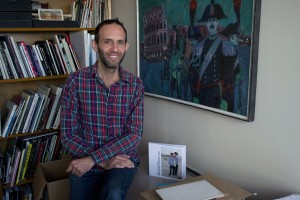Nicholas Muellner, associate professor of cinema, photography and media arts, recently published “The Amnesia Pavilions,” a visual account of his journeys to Eastern Siberia. The book is an autobiographical narrative that details Muellner’s personal growth and friendships with people from around the world during the 17 years he spent traveling.
Staff Writer Chloe Wilson spoke with Muellner about his experience with the book, the friends he made while he was abroad and his plans for the future.
Chloe Wilson: What is the focus of your new novel, “The Amnesia Pavilions?”

Nicholas Muellner: The central story is about me returning to a city in Eastern Siberia where I had spent time and photographed in 1990 and 1992. In 2009 I went back to the same city in Siberia to try to track down a friend that I had lost track of.
CW: Why did you choose this specific journey?
NM: I wanted to remember what my relationship to that person had been because I’m such a different person than I was at that point in my life. I also wanted to go back to that place because I knew it would have changed a lot, and I am interested in how Russia has changed.
CW: What is the main purpose behind your new book?
NM: I am trying to ask a number of questions of the reader and viewer, one of which is how we understand the world through photographs and what the limits of that are.
CW: How is the book structured?
NM: It tries to place an equal but different value on how we read the language and how we read the photographs. There are sections of the book that are just pictures and there are sections of the book that are just text. The way that those forms speak to each other is something that I’m trying to create new conversations about.
CW: What do you think students who have taken your photography classes can gain from reading your book?
NM: I don’t really have a specific thing that I would want them to take away from it. I guess that education and becoming who you are is a long process. There’s a lot of pressure, especially in the current culture, that by the time you’re 21 you know exactly what and who you are, and I think that’s a fallacy that is really pushed through our educational system a lot. And I just don’t think that’s true. We can do a lot and change a lot without having to decide or even know who or what we are as people or as artists and anything else.
CW: Have your other works also focused on Russian history and culture? What about this specific region of the world intrigues you?
NM: My two previous books were with Russia, to various degrees, and I curated an exhibition in Moscow in 2007; I studied Russian language all the way through college, and I studied Russian literature. When I started going to Russia as a young man and speaking Russian and started spending time around Russians, I became really fascinated with the culture, as much fascinated with everything that’s wrong with that culture and what is good about that culture.
CW: Did your artistic style change between your visits to Siberia?
NM: The way in which my photography changed over that time period is also sort of a central narrative of my book. The culture had changed so drastically that my relationship to it was different.
CW: Have you started working on any other projects? What should we expect from you in the future?
NM: The next book that I’ve been working on for quite a while is about a tiny island off the coast of Nicaragua that has bounced back and forth in ownership between different parties over the last 500 years. A project further down the line, which I haven’t really started yet, is more connected to the book I just finished: a documentary book that’s about the lives of gay men in Russian cities where they’re connected to temporary gay identity through the Internet and live in a world of complete and absolute repression.




